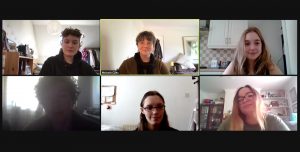Groupwork to produce a collaborative radio programme/podcast
Mindful of the need to produce digitally literate, innovative and creative practitioners in a post-Covid environment, who are able to interact online to create a sense of workplace community, Melanie used Zoom to arrange small live online groups to deliver a group formative assessment: a ‘podcast’ style piece of cutting-edge research. In doing so it encouraged students to be ‘co-present’, share screens, develop netiquette and deliver professional products as a group, preparing them for the kind of blended work environment they are likely to face, following graduation.
Melanie used the timetabled ‘lecture slot’ time online through Zoom, to deliver workshop tasks. Randomly assigned break-out rooms with a mix of year group cohorts crossing degree programmes were used to facilitate group identity and work packages. In between online meetings, the groups organised their own meetings and used a variety of means – e-mail, messaging (WhatsApp) and Zoom meetings – to progress their research, interview experts, locate music and sound effects, produce the script and edit the final digital programme. Online training sessions on the digital audio editing package Audacity were also delivered in this lecture slot.
The result was excellent radio programmes of broadcast standard that were then submitted for final assessment. The task was designed as formative but accounted for 50% of the module where 25% corresponded to the final podcast (a shared group mark) and 25% given for the individual write-up of their role in the final programme. This individual write-up could take the form of a ‘minute book’ of meeting minutes, creative notes, mind-maps, background research and screen-shots of digital editing, in other words, a kind of reflective portfolio which also looked back on their experience of teamwork itself.
See below Radio Programme ‘zoom room’ break-out group, and an art image for one of the broadcasts.
Evaluation / Student Feedback
I can’t tell you how much I’ve enjoyed this course I think with the current situation you’ve really done an amazing job adapting this course to be as engaging and thought evoking as it can be within an online environment There really has been a sense of community What did I enjoy most? Being able to do group work still Having workshops, discussions, and breakout rooms during class made me feel part of a community, exchanging ideas and opinions on both course materials and our lives. especially this semester, after a whole year online, probably having the chance to create such a nice environment as this class, made a huge difference on my satisfaction I very much appreciate the fact that the assessment (as a whole) is not just another essay, but rather, an opportunity to develop other skills such as team-work, creativity and organisation Mel is probably the best support service in this course! Everything on Blackboard was great, but Mel taking time to talk through assessments, concerns, and just being there for an educational chatwas so helpful. We had all the support that one might need for this unit and I can’t think of anything that was missing What support service/resource did you find most helpful? The online training sessions in InDesign and Audacity Various comments under Q13 from the module feedback forms: What things do we do well that have helped you to feel part of a learning community? – In terms of this course I felt a great part of the learning community because I am an MA student taking an undergraduate course. What I mean by this is I was able to interact with students from both second and third year, and also give my opinions as a post-graduate student. This enhanced my learning and sense of belonging in the university. • Extra 2 hours a week in breakout rooms with our podcast groups • Workshops, break out rooms, meetings for group project, consultation hours, and tutorials • Helped us as a group for our projects and provided additional support, examples, and aid in our group work.
Benefits
Created and maintained a strong sense of community, directly allied to summative assessment but feeding through into mixed year seminar groups which strengthened discussion and peer-assisted learning Sharing of different skills enabled them to produce something ‘above and beyond’ the normal assessment, of professional quality.
Top Tips
Use break-out rooms constructively: set up the task, give them time along but ‘drop in’, circulate between them and then bring them back together, enabling them to articulate and validate their learning as a larger group.
References

School: Arts, Languages and Cultures
Discipline: Archaeology
Academic: Melanie Giles
Course: CAHE20721/30721
Cohort Size: 40
Themes: Assessment, Employability and/or student digital skills
Ref: 041



0 Comments